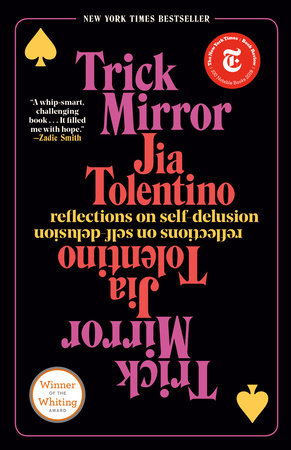 REVIEW:
REVIEW:
Trick Mirror: Reflections on Self-Delusion by
Jia Tolentino
Runestone, volume 7

REVIEW:
Trick Mirror: Reflections on Self-Delusion by
Jia Tolentino
Runestone, volume 7

Trick Mirror: Reflections on Self-Delusion
Jia Tolentino
August 6, 2019
978-0-52551-054-3
305 pages
Reviewed by Cassidy Brzycki
—
In setting out with Trick Mirror: Reflections on Self-Delusion to record her own experiences with the internet, Jia Tolentino has succeeded in capturing a perfect snapshot of the particular struggle with disillusionment that is relatable to any who grew up on the internet. Tolentino depicts the internal thought processes we go through every time we scroll through social media for hours, searching through virtually endless posts for the fraction of a chance that we might find something that makes us feel and be rewarded for our contribution to the like, view, and comment statistics—she does this with such a stunning clarity of voice that you can’t help but think “when did she get inside my head?”
With each new essay, Tolentino recalls a collection of thematically related events that she has experienced or witnessed on the internet. The first essay, “The I in the Internet”, Tolentino explores her childhood on the internet, Gamergate, virtue signaling, her early experiences as a professional blogger, 4chan trolls, civic solidarity, and the destruction of scale in rapid succession. The uniting theme of this essay, as Tolentino describes it, is the “distortion of the social internet”—and it shows. The concise, short length of each easy and the wide range of topics they span all serve to be thrown like a rapid barrage of punches to the gut. Tolentino hits the reader with so many examples so quickly that the reader can’t help but experience the internet’s infamous information overload for themselves.
Tolentino’s writing encapsulates an experience that is intrinsic to the millennial generation, but can be difficult for others outside this sphere to understand. Even those closest to Gen Y will generally have a fundamentally different internet experience. Gen X tend to view the internet as something other, and as such are not so often lured into the same trap of seeing their whole self as a reflection of their social media page. On the other side of the spectrum, Gen Z was born into the height of this golden age of technology, and being exposed to unfiltered internet access from such an early age has forced them to develop coping mechanisms for the information overload that so often grips the millennial.
Only Gen Y, standing in the middle ground, is in the perfect position to suffer and rejoice in the unique experience that growing up alongside the internet has afforded them. As the internet grew and evolved, from the early Web 1.0 building blocks of GeoCities and Angelfire to the monolithic 2.0 titans of Facebook and Twitter that we know today, Tolentino and the rest of her generation grew up right alongside it. The internet can be a powerful teaching tool, however, the lessons we learn from it might not always be the right ones, and unchecked exposure to all of humanity’s greatest highs and lows can be a dangerous thing—especially at the most impressionable period of social development. In the essay“The Story of a Generation in Seven Scams, The Crash”, Tolentino says it best: “one of the best bids a person can make for financial safety in America is to get really good at exploiting other people. This has always been true, but it is becoming all encompassing. And it’s a bad lesson to learn the way millennials did—just as we were becoming adults.”
Reading this labor of love that Tolentino has dedicated to internet hate, it’s difficult not to feel the crushing weight that she lays out again and again on page after page in seemingly endless real-world examples. She laments the experience of watching virtue become virtue signaling; of basing the worth of others and your own self worth off of what you can see on a screen; of the hope and desire to do good and be good being crushed under the seemingly endless force of every bad thing that happens in the world being shown to you in real time; of observing these changes in yourself and being unable to stop them. It’s enough to make you delete the social media apps off your phone, only to redownload them again the next night like the addicts we have all become.
Tolentino has written out the undeniable truth that if you spend your life constantly performing for others and dedicating yourself to too many of the world’s infinite immediate causes for the sake of virtue-signaling, you will burn out, becoming desensitized, anxious, and depressed. So here’s what it comes down to: the internet is an endless buffet of content, and we must learn to be picky with our food, or at the very least eat a balanced meal. Bite into the steak of world events, eat the potatoes that your friends and family post, have some vegetables that taste like righteous tragedy, and enjoy the desert of puppy videos. But do not choke down the things you hate because you look good doing it, do not overload on endless bad news “to be informed”, and for the love of God do not try to digest every post in the infinite buffet unless you feel like throwing up.
CASSIDY BRZYCKI
Hamline University
Cassidy Brzycki is an English/creative writing student at Hamline University. They aspire to make enough money to afford food.
